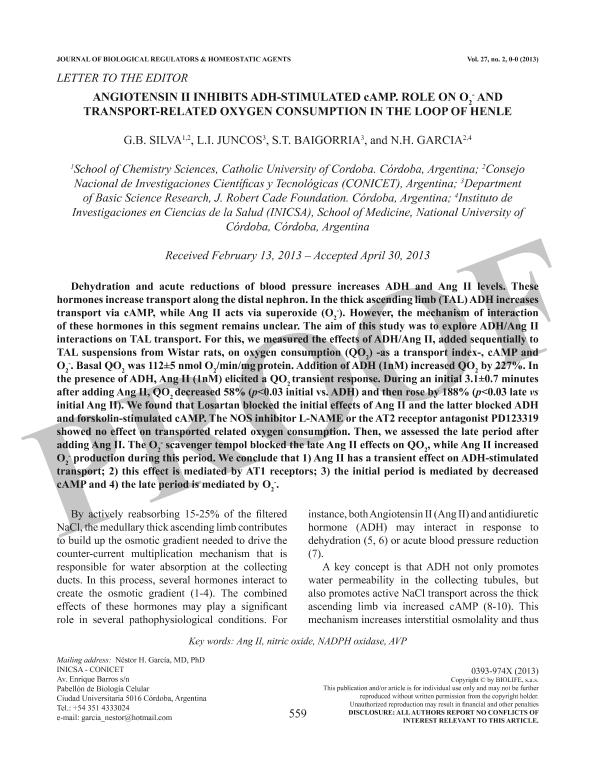Artículo
Angiotensin II inhibits ADH-stimulated cAMP: role on O2- and transport-related oxygen consumption in the loop of Henle
Fecha de publicación:
07/2013
Editorial:
Biolife Sas
Revista:
Journal Of Biological Regulators And Homeostatic Agents
ISSN:
0393-974X
Idioma:
Inglés
Tipo de recurso:
Artículo publicado
Clasificación temática:
Resumen
Dehydration and acute reductions of blood pressure increases ADH and Ang II levels. These hormones increase transport along the distal nephron. In the thick ascending limb (TAL) ADH increases transport via cAMP, while Ang II acts via superoxide (O2-). However, the mechanism of interaction of these hormones in this segment remains unclear. The aim of this study was to explore ADH/Ang II interactions on TAL transport. For this, we measured the effects of ADH/Ang II, added sequentially to TAL suspensions from Wistar rats, on oxygen consumption (QO2) -as a transport index-, cAMP and O2-. Basal QO2 was 112+-5 nmol O2/min/mg protein. Addition of ADH (1nM) increased QO2 by 227 percent. In the presence of ADH, Ang II (1nM) elicited a QO2 transient response. During an initial 3.1+-0.7 minutes after adding Ang II, QO2 decreased 58 percent (p less than 0.03 initial vs. ADH) and then rose by 188 percent (p less than 0.03 late vs initial Ang II). We found that Losartan blocked the initial effects of Ang II and the latter blocked ADH and forskolin-stimulated cAMP. The NOS inhibitor L-NAME or the AT2 receptor antagonist PD123319 showed no effect on transported related oxygen consumption. Then, we assessed the late period after adding Ang II. The O2- scavenger tempol blocked the late Ang II effects on QO2, while Ang II increased O2- production during this period. We conclude that 1) Ang II has a transient effect on ADH-stimulated transport; 2) this effect is mediated by AT1 receptors; 3) the initial period is mediated by decreased cAMP and 4) the late period is mediated by O2-.
Palabras clave:
Camp
,
Superoxide
,
Ang Ii
,
Tubular Transport
Archivos asociados
Licencia
Identificadores
Colecciones
Articulos(CCT - CORDOBA)
Articulos de CTRO.CIENTIFICO TECNOL.CONICET - CORDOBA
Articulos de CTRO.CIENTIFICO TECNOL.CONICET - CORDOBA
Articulos(INICSA)
Articulos de INSTITUTO DE INVESTIGACIONES EN CIENCIAS DE LA SALUD
Articulos de INSTITUTO DE INVESTIGACIONES EN CIENCIAS DE LA SALUD
Citación
Silva, Guillermo Benjamin; Juncos, Luis Isaias; Baigorria, S. T.; Garcia, Nestor Horacio; Angiotensin II inhibits ADH-stimulated cAMP: role on O2- and transport-related oxygen consumption in the loop of Henle; Biolife Sas; Journal Of Biological Regulators And Homeostatic Agents; 27; 2; 7-2013; 569-578
Compartir




